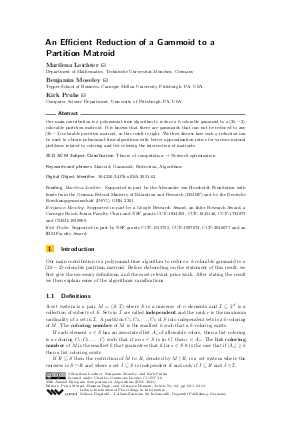An Efficient Reduction of a Gammoid to a Partition Matroid
Authors Marilena Leichter, Benjamin Moseley, Kirk Pruhs
-
Part of:
Volume:
29th Annual European Symposium on Algorithms (ESA 2021)
Part of: Series: Leibniz International Proceedings in Informatics (LIPIcs)
Part of: Conference: European Symposium on Algorithms (ESA) - License:
 Creative Commons Attribution 4.0 International license
Creative Commons Attribution 4.0 International license
- Publication Date: 2021-08-31
File

PDF
LIPIcs.ESA.2021.62.pdf
- Filesize: 0.8 MB
- 13 pages
Document Identifiers
Subject Classification
ACM Subject Classification
- Theory of computation → Network optimization
Keywords
- Matroid
- Gammoid
- Reduction
- Algorithms
Metrics
- Access Statistics
-
Total Accesses (updated on a weekly basis)
0PDF Downloads0Metadata Views
Abstract
Our main contribution is a polynomial-time algorithm to reduce a k-colorable gammoid to a (2k-2)-colorable partition matroid. It is known that there are gammoids that can not be reduced to any (2k-3)-colorable partition matroid, so this result is tight. We then discuss how such a reduction can be used to obtain polynomial-time algorithms with better approximation ratios for various natural problems related to coloring and list coloring the intersection of matroids.
Cite As Get BibTex
Marilena Leichter, Benjamin Moseley, and Kirk Pruhs. An Efficient Reduction of a Gammoid to a Partition Matroid. In 29th Annual European Symposium on Algorithms (ESA 2021). Leibniz International Proceedings in Informatics (LIPIcs), Volume 204, pp. 62:1-62:13, Schloss Dagstuhl – Leibniz-Zentrum für Informatik (2021)
https://doi.org/10.4230/LIPIcs.ESA.2021.62
BibTex
@InProceedings{leichter_et_al:LIPIcs.ESA.2021.62,
author = {Leichter, Marilena and Moseley, Benjamin and Pruhs, Kirk},
title = {{An Efficient Reduction of a Gammoid to a Partition Matroid}},
booktitle = {29th Annual European Symposium on Algorithms (ESA 2021)},
pages = {62:1--62:13},
series = {Leibniz International Proceedings in Informatics (LIPIcs)},
ISBN = {978-3-95977-204-4},
ISSN = {1868-8969},
year = {2021},
volume = {204},
editor = {Mutzel, Petra and Pagh, Rasmus and Herman, Grzegorz},
publisher = {Schloss Dagstuhl -- Leibniz-Zentrum f{\"u}r Informatik},
address = {Dagstuhl, Germany},
URL = {https://drops.dagstuhl.de/entities/document/10.4230/LIPIcs.ESA.2021.62},
URN = {urn:nbn:de:0030-drops-146432},
doi = {10.4230/LIPIcs.ESA.2021.62},
annote = {Keywords: Matroid, Gammoid, Reduction, Algorithms}
}
Author Details
Funding
- Leichter, Marilena: Supported in part by the Alexander von Humboldt Foundation with funds from the German Federal Ministry of Education and Research (BMBF) and by the Deutsche Forschungsgemeinschaft (DFG), GRK 2201.
- Moseley, Benjamin: Supported in part by a Google Research Award, an Infor Research Award, a Carnegie Bosch Junior Faculty Chair and NSF grants CCF-1824303, CCF-1845146, CCF-1733873 and CMMI-1938909.
- Pruhs, Kirk: Supported in part by NSF grants CCF-1535755, CCF-1907673, CCF-2036077 and an IBM Faculty Award.
References
-
Ron Aharoni and Eli Berger. The intersection of a matroid and a simplicial complex. Transactions of the American Math Society, 2006.

-
Ravindra K Ahuja, Thomas L Magnanti, and James B Orlin. Network Flows: Theory, Algorithms, and Applications. Prentice hall, 1993.

-
Kristóf Bérczi, Tamás Schwarcz, and Yutaro Yamaguchi. List colouring of two matroids through reduction to partition matroids. arXiv preprint arXiv:1911.10485, 2019.

-
Jack Edmonds. Minimum partition of a matroid into independent subsets. Journal of Research of the National Bureau of Standards, 69B:67–72, 1965.

-
Sungjin Im, Benjamin Moseley, and Kirk Pruhs. The matroid intersection cover problem. Operations Research Letters, 49(1):17-22, 2020.

-
Jon M. Kleinberg. Single-source unsplittable flow. In Symposium on Foundations of Computer Science, pages 68-77, 1996.

-
Nabil Hassan Mustafa and Saurabh Ray. PTAS for geometric hitting set problems via local search. In Proceedings of the twenty-fifth annual symposium on Computational geometry, pages 17-22, 2009.

-
James Oxley. Matroid Theory. Oxford graduate texts in mathematics. Oxford University Press, 2006.

-
Paul D Seymour. A note on list arboricity. Journal of Combinatorial Theory, Series B, 72(1):150-151, 1998.

-
Vijay Vazirani. Approximation Algorithms. Springer-Verlag, 2001.

-
David P. Williamson and David B. Shmoys. The Design of Approximation Algorithms. Cambridge University Press, 2011.

